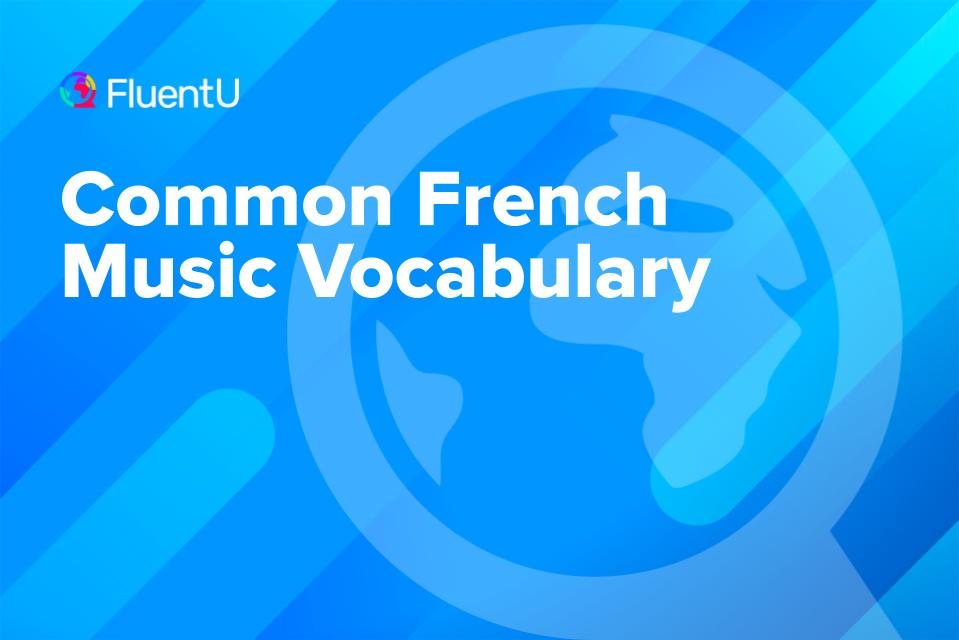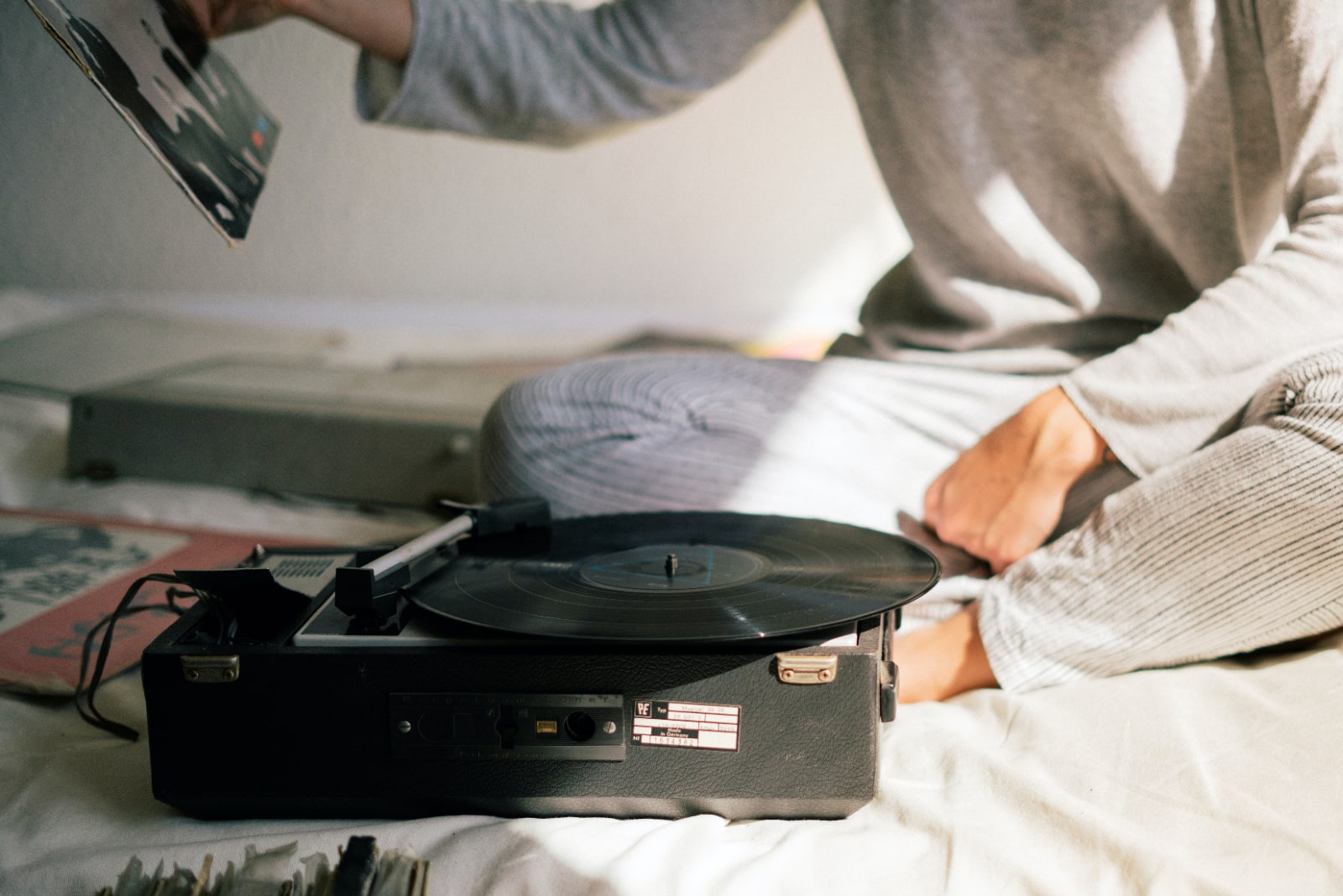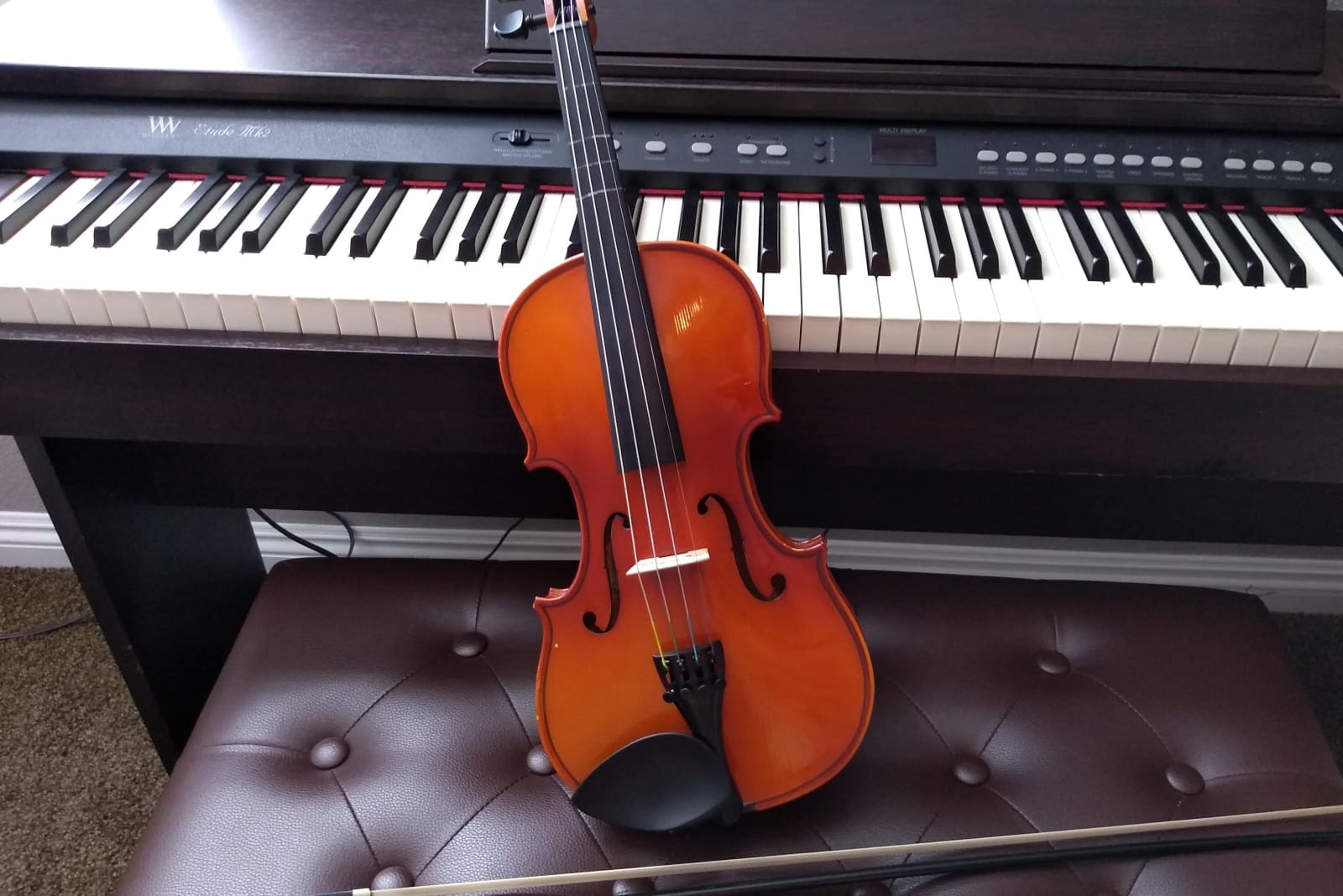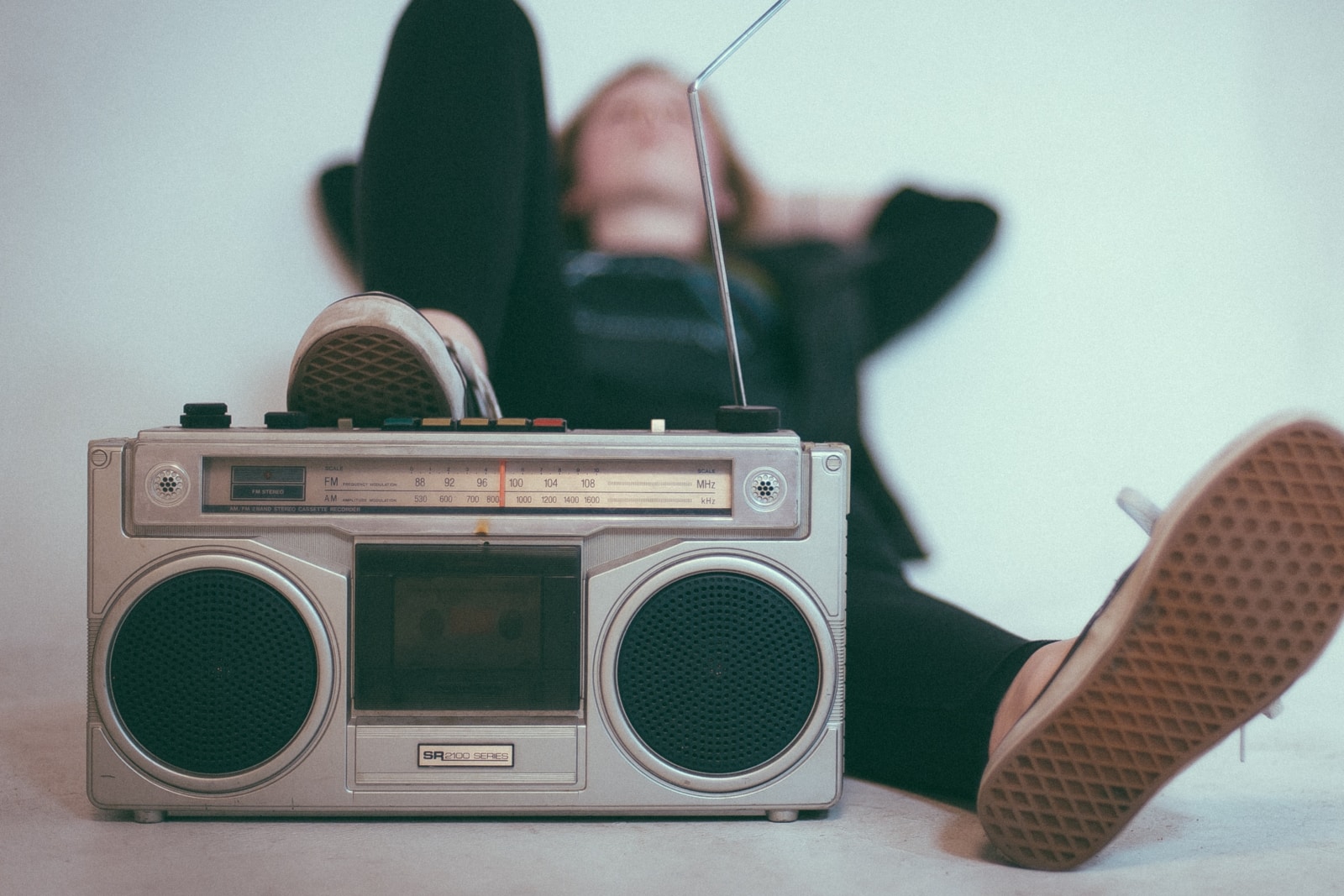Common French Music Vocabulary

When learning French, it’s important to diversify your vocabulary by learning how to discuss a wide variety of subjects. And finding something that genuinely interests you, like music, enables you to have fun while learning.
Furthermore, being able to talk about music is a great way to connect with others through engaging conversations while practicing your French at the same time. So, I’ve prepared loads of interesting French music expressions and vocabulary for you that will be… music to your ears.
Download: This blog post is available as a convenient and portable PDF that you can take anywhere. Click here to get a copy. (Download)
The Basics of French Music Vocabulary
The following will be your go-to essentials when talking about any sort of music in French.
- La musique — music
- Le musicien / La musicienne — the musician (masculine/feminine)
- Le groupe — the band
- Chanter — to sing
- Le chanteur / La chanteuse — the singer (masculine/feminine)
- Le chant — singing
- La chanson — a song
- La voix — voice
- Le rythme — rhythm
- La partition — sheet music
- L’accord — chord
- Le compositeur — composer
- La mélodie — melody
- La danse — dance
You might use the above words in order to start a conversation with someone new.
Try asking them, “Quel groupe préférez-vous ?” (“Which band is your favorite?”) or “Aimez-vous chanter ?” (“Do you like to sing?”). These are excellent ways to strike up a great conversation.
Music Genres in French
Here are some of the most common music genres—without going into really technical (and probably not as useful) sub-genres.
These are extremely easy to learn as they’re all similar to their English counterparts. In fact, many of the French music genre terms are anglicisms, meaning they borrow the English word.
- Le jazz — jazz
- La musique classique — classical
- L’opéra — opera
- La pop — pop
- Le rock — rock
- Le hip-hop — hip-hop
- Le rap — rap
- L’alternatif — alternative
- Le grunge — grunge
- La country — country
- L’électronique — electronic
- Le reggae — reggae
- Le folk — folk
- Le heavy metal — heavy metal
- Le blues — blues
- Le funk — funk
- La soul — soul music
- Le disco — disco
Talking about music genres is another great way to connect with others.
Try asking someone, “Quel genre de musique aimez-vous ?” (“What type of music do you like?”) or offering up your favorite type of music. For example, you might say, “Je préfère le rock et la pop” (“I prefer rock and pop music”).
Playing Instruments
In this section, you’ll find some major instruments plus useful phrases to use when talking about playing them.
While many of them are similar to their English definitions, pay careful attention to the way in which each is spelled, as their spelling almost always differs by a letter or two.
- Les instruments — instruments
- Le piano — piano
- La guitare — guitar
- La guitare acoustique — acoustic guitar
- La guitare électrique
— electric guitar
- La batterie — drums
- Le tuba — tuba
- La trompette — trumpet
- La clarinette — clarinet
- La flûte — flute
- Le saxophone — saxophone
- La basse — bass
- La guitare basse — bass guitar
- Le violon — violin
- L’accordéon — accordion
- Le violoncelle — cello
- L’orgue — organ
- La cornemuse — bagpipes
- L’harmonica — harmonica
- Le trombone — trombone
- Le banjo — banjo
- Enregistrer — to record
- Jouer — to play
You use jouer de when talking about playing a musical instrument. You must remember to add the preposition de before the instrument.
Je joue du trombone. (I play the trombone.)
Notice that, as always in French, the preposition forms the correct contraction with the article when appropriate. In this case, the article is le (the). In other words, you don’t say je joue de le trombone but rather je joue du trombone.
Here’s one more example:
Ils jouent du banjo. (They play the banjo.)
Aside from telling people what instrument you play, you can ask them if they play an instrument by saying, “Jouez-vous d’un instrument ?” (“Do you play an instrument?”).
Listening to Music in French
Here are some ways in which you might talk about listening to music.
- Écouter — to listen
- Le casque — headphones
- Les écouteurs — earbuds
- Le CD — CD
- Le lecteur de CD — CD player
- Le disque — a record
- Le tourne-disque — record player
- Télécharger — to download
- Le mp3 — mp3 file
- La stéréo — stereo
- La radio — radio
- L’album — album
- Le streaming — music streaming
- L’écoute en ligne — online listening
- La cassette — cassette tapes
Chances are you’ll use this vocabulary a good bit.
For example, you might say, “Avez-vous entendu le nouvel album du groupe ?” (“Have you heard the band’s new album?”) or “J’ai besoin d’acheter les nouveaux écouteurs.” (“I need to buy new earbuds”).
French Concert Vocabulary
The following vocabulary provides you with everything you need to know about discussing concerts.
- Le concert — concert
- L’orchestre — orchestra
- Le micro — microphone
- Jouer — to perform
- La foule — the crowd
- Le public — the public
- Les spectateurs — the spectators
- La prestation — the performance
- La première partie — opening act
- L’artiste — artist
- Les applaudissements — applause
- Les billets — tickets
- Les projecteurs — spotlights
- La sono — sound system
- Encore ! — Encore!
You would think that this would be a no-brainer, as English adopted this word from French. However, while the French do use encore to request that a musician or band play more, they also use une autre (another) and bis (repeat/again).
To ask someone to go to a concert with you, simply say, “Veux-tu aller au concert avec moi ?” (“Do you want to go to the concert with me?”).
Musical Festival Vocabulary
As music festivals become more and more popular, it’s important to know how to discuss them in French.
- Le festival de musique — the music festival
- L’événement — event
- La scène — stage
- Les volontaires — volunteers
- Les coulisses — backstage
- Le passe — pass (such as the document that allows you access to the festival)
- Se rassembler — to gather/to assemble
- La programmation — the lineup
- Le camping — camping
- Les festivaliers — festival goers
- La musique live — live music
- Les artistes — artists
- La billetterie — ticketing
- L’ambiance — atmosphere
- La Fête de la Musique — music Day
La Fête de la Musique is a huge national day of music that has been taking place annually each summer in France since 1982. Anyone can register their band or themselves to play an event and all sorts of stages are set up across each city.
Music can be heard playing every block or so and lasts all day and night. The purpose of the festival is not only to celebrate music but to give amateur or lesser-known musicians a place and time to share their music and get noticed.
If you’d like to ask someone to attend a music festival with you, simply say, “Tu veux aller au festival de musique avec moi ?” (“Do you want to go to the music festival with me?”).
On the other hand, if you’re invited to attend a music festival, perhaps you’ll want to ask questions like, “Quelle est la programmation ?” (“What is the lineup?”) or “Avons-nous des passes pour le week-end ?” (“Do we have weekend passes?”).
Resources for Learning and Practicing French Music Vocabulary
Once you’ve read through this list of music vocabulary, you’ll need to make sure you really solidify it in your memory through practice.
There are many different resources for trying out what you’ve learned, such as:
- Music vocabulary games, flashcards and quizzes on Quizlet, a website that offers study sets on a variety of topics.
- This Easy French YouTube video, in which they interview Parisians about music
- The “Parzonnez-Moi” (“Excuse Me”) YouTube video in which Céline Dion discusses her music career in an interview. Céline is not only fun to watch but uses tons of great music terms when talking about her albums.
You can also now turn any YouTube video into a language lesson with FluentU.
FluentU takes authentic videos—like music videos, movie trailers, news and inspiring talks—and turns them into personalized language learning lessons.
You can try FluentU for free for 2 weeks. Check out the website or download the iOS app or Android app.
P.S. Click here to take advantage of our current sale! (Expires at the end of this month.)
And, if you want to extend your studies to actual songs, you can check out these posts on the best French songs to learn with:
- 12 French Songs with Lyric Videos for Fun and Catchy Vocab Lessons
- 18 Super Popular French Songs for Your Next Jam (or Learning) Session
- Learn French with Songs: 23 Hits to Help Improve Your French Skills
Whichever style of learning you prefer, there are tons of great ways to practice important music vocabulary.
Now that you’ve had a crash-course in French music vocabulary, you’re ready to discuss festivals, concerts, singers and all that jazz!
Download: This blog post is available as a convenient and portable PDF that you can take anywhere. Click here to get a copy. (Download)
And One More Thing...
If you like learning French at your own pace and from the comfort of your device, I have to tell you about FluentU.
FluentU makes it easier (and way more fun) to learn French by making real content like movies and series accessible to learners. You can check out FluentU's curated video library, or bring our learning tools directly to Netflix or YouTube with the FluentU Chrome extension.
One of the features I find most helpful is the interactive captions—you can tap on any word to see its meaning, an image, pronunciation, and other examples from different contexts. It’s a great way to pick up French vocab without having to pause and look things up separately.
FluentU also helps reinforce what you’ve learned with personalized quizzes. You can swipe through extra examples and complete engaging exercises that adapt to your progress. You'll get extra practice with the words you find more challenging and even be reminded you when it’s time to review!
You can use FluentU on your computer, tablet, or phone with our app for Apple or Android devices. Click here to take advantage of our current sale! (Expires at the end of this month.)

















